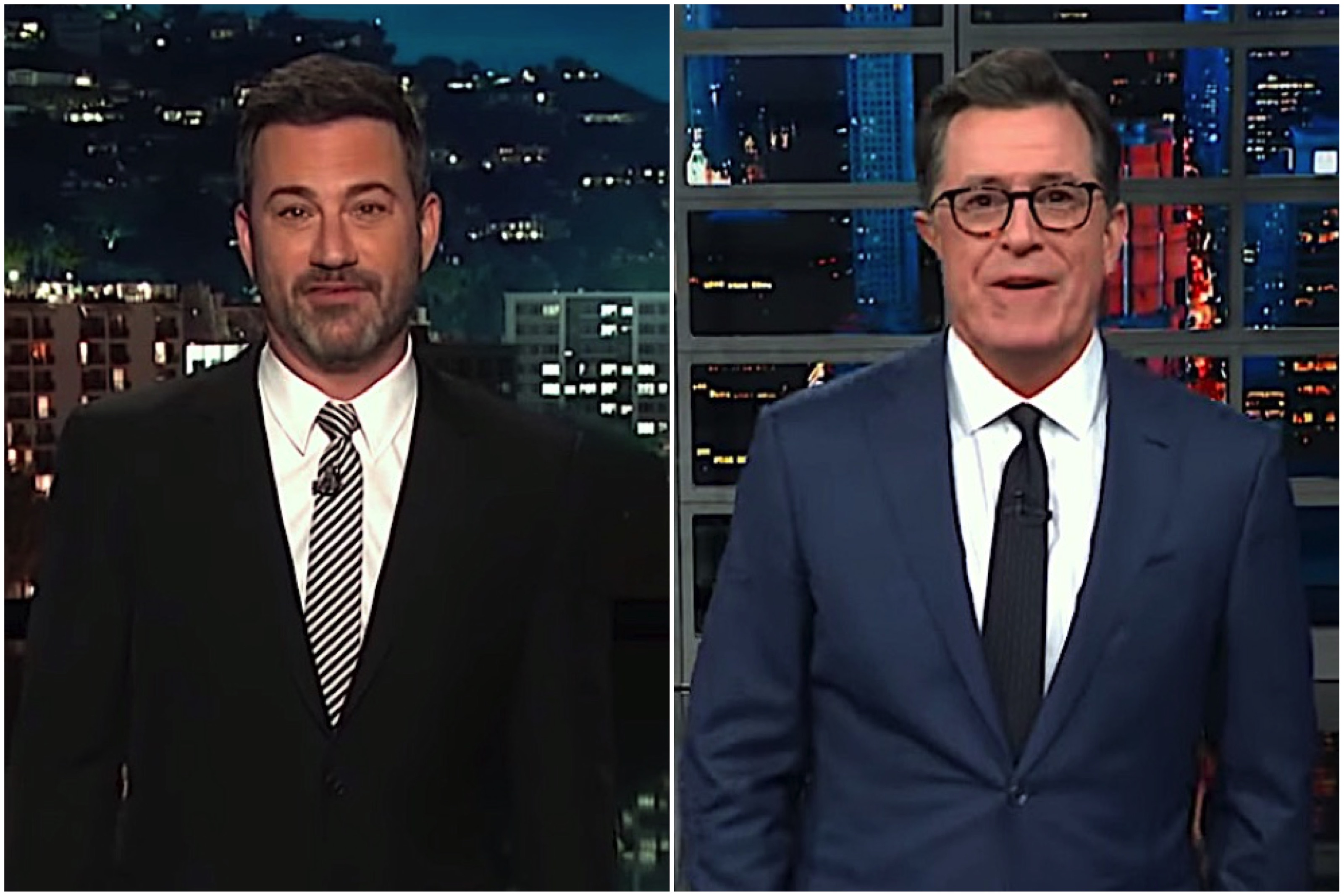In a surprising turn of events, Disney has reinstated late-night host Jimmy Kimmel after a brief period of controversy surrounding his recent comments and the network’s internal review.
The decision to bring Kimmel back has sparked widespread discussion among fans, media critics, and industry insiders, highlighting the delicate balance entertainment companies face when managing public figures whose outspoken nature sometimes stirs debate.

Kimmel’s relationship with Disney and its affiliated ABC network has been longstanding, with his show serving as a popular fixture in late-night television. However, earlier this year, remarks made by Kimmel during a monologue led to a temporary suspension, igniting a firestorm of opinions on freedom of speech and corporate responsibility.
Supporters argued that his commentary reflected a necessary voice in today’s polarized cultural climate, while detractors claimed it crossed lines of decency and professionalism.
The reinstatement came after an internal review process that examined not only the specific incident but Kimmel’s overall contribution and influence on the network’s brand.
Disney executives ultimately concluded that Kimmel’s value as a leading comedic and cultural commentator outweighed the risks associated with controversy.
This decision reflects a broader trend in entertainment companies reevaluating their stance on outspoken talent, recognizing that in an era of social media amplification, public figures who provoke conversation can also drive engagement.
Industry analysts noted that the reinstatement could signal Disney’s commitment to maintaining a diverse range of voices, even those that may challenge traditional boundaries.
The move has been met with both applause and criticism, underscoring the ongoing debate about the role of entertainers in political and social discourse.
For Kimmel himself, the return to the airwaves offers a chance to reclaim his platform and continue influencing national conversations, particularly on issues such as healthcare, politics, and social justice, which have become staples of his commentary.

In stark contrast to the entertainment world, recent news from the political arena has taken a far more dramatic and ominous turn. Speculation about “The Rapture” — an apocalyptic event often referenced in religious circles — has surged following a series of highly unusual global occurrences and statements from prominent religious leaders.
This resurgence in talk about the end times has captured the imagination and anxiety of millions, blending faith, prophecy, and current events in a way rarely seen before.
The heightened focus on apocalyptic themes has been fueled by a confluence of factors: natural disasters, geopolitical unrest, and a growing sense of instability in international relations.
Various religious groups and leaders have interpreted these developments as signs of the impending Rapture, where, according to certain Christian beliefs, believers will be taken up to heaven while the rest of humanity faces tribulation.
Social media platforms have seen an explosion of content discussing these ideas, ranging from serious theological debate to sensationalized conspiracy theories.
This phenomenon has prompted not only religious reflection but also social and political responses. Governments in several countries have issued statements urging calm and caution against panic, emphasizing that these beliefs, while deeply held by many, should not translate into fear-driven actions.
Experts in sociology and psychology have noted the rise in apocalyptic thinking as a coping mechanism in uncertain times, a way for people to make sense of chaos and assert some control over an unpredictable future.

The cultural impact of the renewed focus on the Rapture extends beyond religious circles. It has influenced popular media, with films, television shows, and literature exploring end-of-world scenarios gaining popularity.
At the same time, community groups and interfaith dialogues have increased efforts to foster understanding and peace, aiming to mitigate the fear and division that apocalyptic narratives can sometimes exacerbate.
Amid these dramatic shifts in culture and faith, political news has added a layer of intrigue and scandal. Recent investigations have uncovered that a high-ranking official appointed by former President Donald Trump to oversee border security has been caught accepting a bribe of $50,000.
This revelation has sent shockwaves through political and law enforcement communities, reigniting debates about corruption, accountability, and the challenges of managing the nation’s border policies.
The official in question, who served as a Border Czar during the Trump administration, was implicated through a multi-agency sting operation that traced illicit payments linked to efforts to bypass immigration protocols.
The $50,000 bribe allegedly came from individuals seeking to facilitate unauthorized entry or avoid penalties, raising serious questions about the integrity of border enforcement under that leadership. The investigation is ongoing, with prosecutors expected to bring formal charges soon.
This scandal has broader implications for the political landscape, particularly in discussions about immigration reform and enforcement. Critics of the Trump administration’s border policies argue that corruption and mismanagement undermined national security and public trust.
Supporters, meanwhile, have expressed concern that the investigation is politically motivated, accusing opponents of using the scandal to discredit past policies.

The revelation has also spurred calls for more stringent oversight and transparency in border operations. Lawmakers from both parties have proposed measures aimed at tightening controls and increasing accountability among officials responsible for managing the country’s borders.
This includes proposals for enhanced background checks, real-time monitoring systems, and whistleblower protections to prevent future abuses of power.
The intersection of these stories — a celebrated comedian’s return to a major entertainment platform, the rekindling of apocalyptic fervor, and a high-profile political corruption case — paints a vivid picture of the complexity and volatility of today’s social and political climate. Each narrative reflects different facets of a society grappling with issues of trust, belief, and power.
As Jimmy Kimmel returns to the spotlight, his platform may serve as a forum for addressing some of these larger themes, blending humor with critical reflection on the world’s challenges.
Meanwhile, the discourse around the Rapture reveals deep-seated anxieties and hopes that transcend politics and media, touching on fundamental questions about life, purpose, and destiny. And the corruption scandal at the border highlights the ongoing struggles within governance to uphold justice and integrity amid competing interests and pressures.
Together, these stories underscore the importance of vigilance, dialogue, and ethical leadership across all sectors. Whether through entertainment, faith, or politics, the need for transparency, compassion, and understanding remains paramount.
As the public navigates these intersecting narratives, the hope is that lessons learned will lead to greater accountability, unity, and resilience in the face of uncertainty.
In a world where headlines shift rapidly and controversies unfold at a dizzying pace, the stories of Jimmy Kimmel, apocalyptic predictions, and political scandals remind us that beneath the noise lie deeper currents shaping the collective experience.
It is through thoughtful engagement with these issues that societies can find pathways forward, balancing freedom of expression with responsibility, belief with reason, and authority with justice.
News
Reality Star Erin Bates Suffers Traumatic Health Scare After Delivery—Septic Shock Leaves Her Right Leg Useless as Fans Rally Around the Bringing Up Bates Mom in Her Most Painful Chapter Yet.
Bringing Up Bates star Erin Bates says she is unable to use her right leg in the wake of her…
Fever ERUPT in Game 2 Victory Over Atlanta—but Fan BACKLASH Continues as Caitlin Clark ‘Nontroversy’ DIVIDES Viewers! Is This Win Enough to SILENCE the Critics or Just Fuel the Fire?
In a performance fueled by grit, pride, and a deafening home crowd, the Indiana Fever brought the house down, delivering…
Paige Bueckers’ SHOCK Rookie of the Year Reveal STUNS Fans—Fever BARELY Survive Elimination as WNBA Ratings CONTROVERSY Explodes! What the League DOESN’T Want You to Know!
In a whirlwind 48 hours that encapsulated the exhilarating chaos and simmering controversies of the 2024 WNBA season, three distinct…
Caitlin Clark Fans TUNE OUT as Fever Ratings TANK 47% in Playoffs! WNBA, ION HIDE Viewership!
The house of cards that the WNBA so carefully constructed throughout its magical 2024 season is beginning to tremble. The…
Caitlin Clark WATCHES Courtside as Fever Crush Dream—FANS EXPLODE Over Star Being SIDELINED in Pivotal Game 2 Victory! Why Was the League’s Biggest Name OFF the Court?!
Even in street clothes, she was the center of the universe. In a crucial, season-defining Game 2 victory for the…
CHAOS ERUPTS: Fever Fans FURIOUSLY Storm Out Mid-Game Screaming “WE WANT CAITLIN”—Indiana Crowd TURNS on Team After Benching Clark in Unbelievable NBA Meltdown!
The Indiana Fever’s 2024 season, once a soaring testament to the power of a single superstar, has descended into a…
End of content
No more pages to load






Leave a Reply